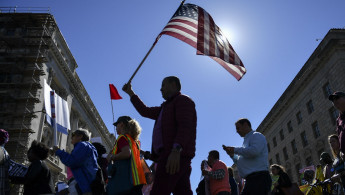US to decide if Trump's 'travel ban' is racist
The court will decipher the legality of the order - previously dubbed "the Muslim Ban" - deciding whether the US president exceeded his powers and engaged in religious discrimination in the third version of the travel ban, following moves by lower courts in California, Hawaii and other states which have repeatedly ruled that Trump's order targets Muslims - a clear violation of the US Constitution.
"We have always known this case would ultimately be decided by the United States Supreme Court," said state Attorney General Doug Chin of Hawaii.
"This will be an important day for justice and the rule of law. We look forward to the court hearing the case."
In December, the conservative-tilting court rejected calls for a freeze on the ban, which now targets citizens from Iran, Libya, Somalia, Syria, and Yemen, as well as North Korea and Venezuela, allowing Trump to implement it while it was being challenged in lower courts.
The US administration has so far rewritten the ban twice, adding more national security justifications in the latest iteration in September and including citizens of North Korea and Venezuela to counter the argument the government was singling out Muslim countries.
Citizens of those countries, except Venezuela, are generally barred from getting visas that would allow them to travel to the US permanently as immigrants. The rules for visas for temporary visitors, like tourists or students, vary among the countries, with Syrian citizens blocked.
Meanwhile, there are limited possibilities for any exceptions or waivers, like a Syrian national also holding dual citizenship with an unrestricted country.
While signing the order days after his January 2017 inauguration, Trump said the goal of the travel ban was to "keep radical Islamic terrorists out".
"We only want to admit those into our country who will support our country and love deeply our people," the president added.
 |
'Politics of demonisation'
But the order has been widely slammed by international and national rights group since it was first implemented last year.
Earlier this week, the Council on American-Islamic Relations (CAIR) blasted Trump and his administration for his role in the sharp increase in attacks and discrimination against Muslims in 2017.
The number of reported anti-Muslim hate crimes and reported incidents of discrimination, bullying, harassment and other acts of anti-Muslim bias jumped 15 percent last year, CAIR said in a report.
"Trump's xenophobic rhetoric... emboldened those who sought to express their anti-Muslim bias and provided a veneer of legitimacy to bigotry," the report said.
CAIR said the number of anti-Muslim hate crimes reported jumped from 260 in 2016 to 300 in 2017, while the incidents of anti-Muslim bias rose from 2,213 to 2,599.
The report noted many anti-Muslim attackers cite Trump during their assaults on Muslims.
In one such case, a traveller who kicked and cursed a Muslim employee at New York's JFK Airport in March 2017 told his victim: "Trump is here now. He will get rid of all of you. You can ask Germany, Belgium and France about these kinds of people. You see what happens."
The man was apparently referring to terror attacks carried out by Muslim extremists in those countries.
In another case reported in the same month, a man threw rocks at a Muslim family's home near Chicago and threatened to kill them. When police questioned him, he told them: "That's what Trump would do."
Rights group Amnesty International also weighed in on the criticism, noting the "politics of demonisation" provided fertile ground for human rights abuses in 2017.
The UK-based group slammed the US president's "transparently hateful" executive order banning entry to citizens of several Muslim-majority countries.
Amnesty Secretary-General Salil Shetty singled out Trump for criticism, saying the travel ban "set the scene for a year in which leaders took the politics of hate to its most dangerous conclusion".
Follow us on Twitter: @The_NewArab



